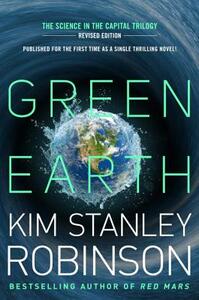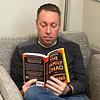Take a photo of a barcode or cover
informative
inspiring
reflective
fast-paced
Plot or Character Driven:
A mix
Strong character development:
Yes
Loveable characters:
Yes
Diverse cast of characters:
No
Flaws of characters a main focus:
No
In Green Earth, we see how abrupt climate change can create interrelated effects that require a unified effort by the governing bodies of the world to mitigate. Flooding in low-lying regions, blackouts caused by the extreme cold of polar vortices, accelerated glacial melt, and more ... all of which are hardly science fiction any longer, making this novel (actually a trilogy edited down into a single, nicely manageable 1100 page book) echo the news in a way that was terrifying. The defining difference between "Green Earth" and today is that, in the novel, the mechanisms of government bend toward action, led by science enthusiast President Phil Chase, whereas we currently have lumpen corporate apologist and oligarch Donald Trump "leading" our country and by extension setting a heedlessly destructive agenda for the rest of the globe.
The lesson to take away is the need for united, science-driven action to address this rapidly worsening issue before it's too late. "Green Earth" lays on thick the moral that we need to think of the younger generation when making decisions about how to consume energy, and how much. It also contains an entire Buddhist subplot that probably serves to emphasize how we are all connected, and the need for "good action," but I think the full point may have been lost somewhere in the editing down into a single novel.
Speaking of which, I found the three-into-one approach a bit lacking, although I'm not sure I would have read all three books in the trilogy separately, so it's twelve of one, half dozen of the other. It was difficult to understand why some aspects were included -- the Buddhists, or Frank's incessant and very tiresome ogling of women -- while many big questions seemed unresolved. The main issue of whether or not the US managed to lead the rest of the world into a successful climate mitigation strategy was never wrapped up! Perhaps because we ourselves should be figuring this out now, so KSR left it purposefully unresolved? Frank's vague indecision lasted for hundreds of pages without any particular point except to slow down the action with confusing self-reflection. Anyway, a bit uneven but overall extremely thought-provoking. I've recommended it to a dozen people already, just because it's so eerily timely a book.
The lesson to take away is the need for united, science-driven action to address this rapidly worsening issue before it's too late. "Green Earth" lays on thick the moral that we need to think of the younger generation when making decisions about how to consume energy, and how much. It also contains an entire Buddhist subplot that probably serves to emphasize how we are all connected, and the need for "good action," but I think the full point may have been lost somewhere in the editing down into a single novel.
Speaking of which, I found the three-into-one approach a bit lacking, although I'm not sure I would have read all three books in the trilogy separately, so it's twelve of one, half dozen of the other. It was difficult to understand why some aspects were included -- the Buddhists, or Frank's incessant and very tiresome ogling of women -- while many big questions seemed unresolved. The main issue of whether or not the US managed to lead the rest of the world into a successful climate mitigation strategy was never wrapped up! Perhaps because we ourselves should be figuring this out now, so KSR left it purposefully unresolved? Frank's vague indecision lasted for hundreds of pages without any particular point except to slow down the action with confusing self-reflection. Anyway, a bit uneven but overall extremely thought-provoking. I've recommended it to a dozen people already, just because it's so eerily timely a book.
hopeful
medium-paced
Moderate: Misogyny, Sexism
I remember when the the Science in the Capital books came out; I was unconvinced about whether I could face a near-future story about climate change. So I did nothing about reading them. Then I recently discovered that the books had been released as an omnibus edition, and I figured - why not. And the introduction to this edition reveals that it's a director's cut - and not in the way that Raymond E Feist did his version of Magician: in this case Robinson has actually cut extraneous material, for a variety of reasons, and I'm quite impressed by that whole process.
So anyway, now I have read the trilogy-that's-really-one-long-book. And it must be said that it's rare for me to finish a book where I kinda loathe the main character.
The book opens in a style that suggests the story will be told through a variety of voices. Each chapter opens with some extended comment on science or politics or global events, and then the chapter proceeds with different characters going about their everyday lives - which frequently interact with each other, and with making science- and climate-related decisions. There's Anna, a scientist at the National Science Foundation; Frank, a visiting scientist at the NSF; Charlie, Anna's husband and advisor to a senator, who works from home and is mostly caring for his youngest son; Leo, a scientist in a small biotech startup lab; and a couple of others. As it went on, though, there was somewhat less of this multi-focused approach.
It was intriguing to read a book that paired the domestic, sometimes banal, frequently humdrum lives of its characters - in the office, or the home, or the lab - with important scientific discoveries or crucial policy decisions. Like in real life. The conversations often looked really odd on paper... until I listened to them properly in my head, and then they sounded like just normal conversations. Zagging in odd directions, incomplete sentences, and so on. Robinson has often captured actual life with true verisimilitude, and I mostly enjoyed it.
However, the character that I initially liked the least is the one who ends up having most of the narrative. This is Frank. He has what I regard as a poor attitude to science, and an even worse one towards women. If I had realised that this was going to be largely Frank's narrative, I may not have kept going. In fact it's possible that if I had been reading this as three separate books, I would not have picked up the second after the first.
Now, I have little objection to abandoning a book - I mean I hate doing it, but I will, because life is too short to read crap books. So why didn't I abandon this book? Because I did want to know what would happen to the other characters. And because I was truly interested in where Robinson would go both in destroying the world through climate change, and suggesting possible ways of dealing with it.
Was it worth it? I still didn't like Frank. In fact I got really impatient with him, and his whole personal storyline seemed pretty weird and actually beside the point for the overall story... and this sense is growing the more I think about it. However, as a way of thinking about how science might help the world deal with the repercussions of climate change, it's certainly an intriguing novel. And like many of Robinson's books, ultimately hopeful. (Perhaps too hopeful?) So I don't regret reading it. For a reader who is interested in both politics and science, I expect this would hit a lot of buttons (unless you're very over the 'America saves the world' narrative, which this leans into pretty heavily, so be warned).
Sadly, Robinson made yet another odd statement about an Australian animal (he implied there's not that many black swans in Red Moon). This time, a character comes across an animal dead in the snow: it's a wombat, and then there's mention of warm-weather critters needing to be looked after. I've seen wombats in the snow a lot, so... nah. Not so much.
So anyway, now I have read the trilogy-that's-really-one-long-book. And it must be said that it's rare for me to finish a book where I kinda loathe the main character.
The book opens in a style that suggests the story will be told through a variety of voices. Each chapter opens with some extended comment on science or politics or global events, and then the chapter proceeds with different characters going about their everyday lives - which frequently interact with each other, and with making science- and climate-related decisions. There's Anna, a scientist at the National Science Foundation; Frank, a visiting scientist at the NSF; Charlie, Anna's husband and advisor to a senator, who works from home and is mostly caring for his youngest son; Leo, a scientist in a small biotech startup lab; and a couple of others. As it went on, though, there was somewhat less of this multi-focused approach.
It was intriguing to read a book that paired the domestic, sometimes banal, frequently humdrum lives of its characters - in the office, or the home, or the lab - with important scientific discoveries or crucial policy decisions. Like in real life. The conversations often looked really odd on paper... until I listened to them properly in my head, and then they sounded like just normal conversations. Zagging in odd directions, incomplete sentences, and so on. Robinson has often captured actual life with true verisimilitude, and I mostly enjoyed it.
However, the character that I initially liked the least is the one who ends up having most of the narrative. This is Frank. He has what I regard as a poor attitude to science, and an even worse one towards women. If I had realised that this was going to be largely Frank's narrative, I may not have kept going. In fact it's possible that if I had been reading this as three separate books, I would not have picked up the second after the first.
Now, I have little objection to abandoning a book - I mean I hate doing it, but I will, because life is too short to read crap books. So why didn't I abandon this book? Because I did want to know what would happen to the other characters. And because I was truly interested in where Robinson would go both in destroying the world through climate change, and suggesting possible ways of dealing with it.
Was it worth it? I still didn't like Frank. In fact I got really impatient with him, and his whole personal storyline seemed pretty weird and actually beside the point for the overall story... and this sense is growing the more I think about it. However, as a way of thinking about how science might help the world deal with the repercussions of climate change, it's certainly an intriguing novel. And like many of Robinson's books, ultimately hopeful. (Perhaps too hopeful?) So I don't regret reading it. For a reader who is interested in both politics and science, I expect this would hit a lot of buttons (unless you're very over the 'America saves the world' narrative, which this leans into pretty heavily, so be warned).
Sadly, Robinson made yet another odd statement about an Australian animal (he implied there's not that many black swans in Red Moon). This time, a character comes across an animal dead in the snow: it's a wombat, and then there's mention of warm-weather critters needing to be looked after. I've seen wombats in the snow a lot, so... nah. Not so much.
I really enjoyed about 90% of this book. KSR does a great job at explaining details behind some of the characters thoughts and ideas, as well as stays true (as far as I could tell) to the upper beurocracy of the government.
The reason I don't give this 5 stars is because there were a few sections throughout the book that seemed to drag on about nothing. Also, I really did not enjoy the ending. The book seems like it could have been twice as long to wrap up the whole theme of the book yet it just kind of ends when the character arcs do.
All in all, I really did enjoy this book and can see myself rereading it in the future.
The reason I don't give this 5 stars is because there were a few sections throughout the book that seemed to drag on about nothing. Also, I really did not enjoy the ending. The book seems like it could have been twice as long to wrap up the whole theme of the book yet it just kind of ends when the character arcs do.
All in all, I really did enjoy this book and can see myself rereading it in the future.
I enjoyed the storylines a lot, but some of them felt like they were not as deeply developed as the could/should have been. I want to go back and read the original 3 books to see what was lost in the compression.
I really enjoy Kim's books. This is a lengthy one, an aggregation of 3 previous books with some paring down of material (Forty Signs of Rain, Fifty Degrees Below, Sixty Days and Counting - the Science in the Capital trilogy). It took me a while to finish it. I love how he imagines a future of climate change, with people taking action to try to deal with it. And I love how he ties in things that I'm familiar with, like disc golf, in ways that lend credence to the other topics that he touches on, like surfing, which I'm _not_ really familiar with. His characters are quite distinct and very human, with strengths and weaknesses that make them interesting to follow. There are still a bunch of his books that I haven't read yet. I can't wait!




